President & Professor
From foreign policy to feminism, Carter shares insights with Emory students
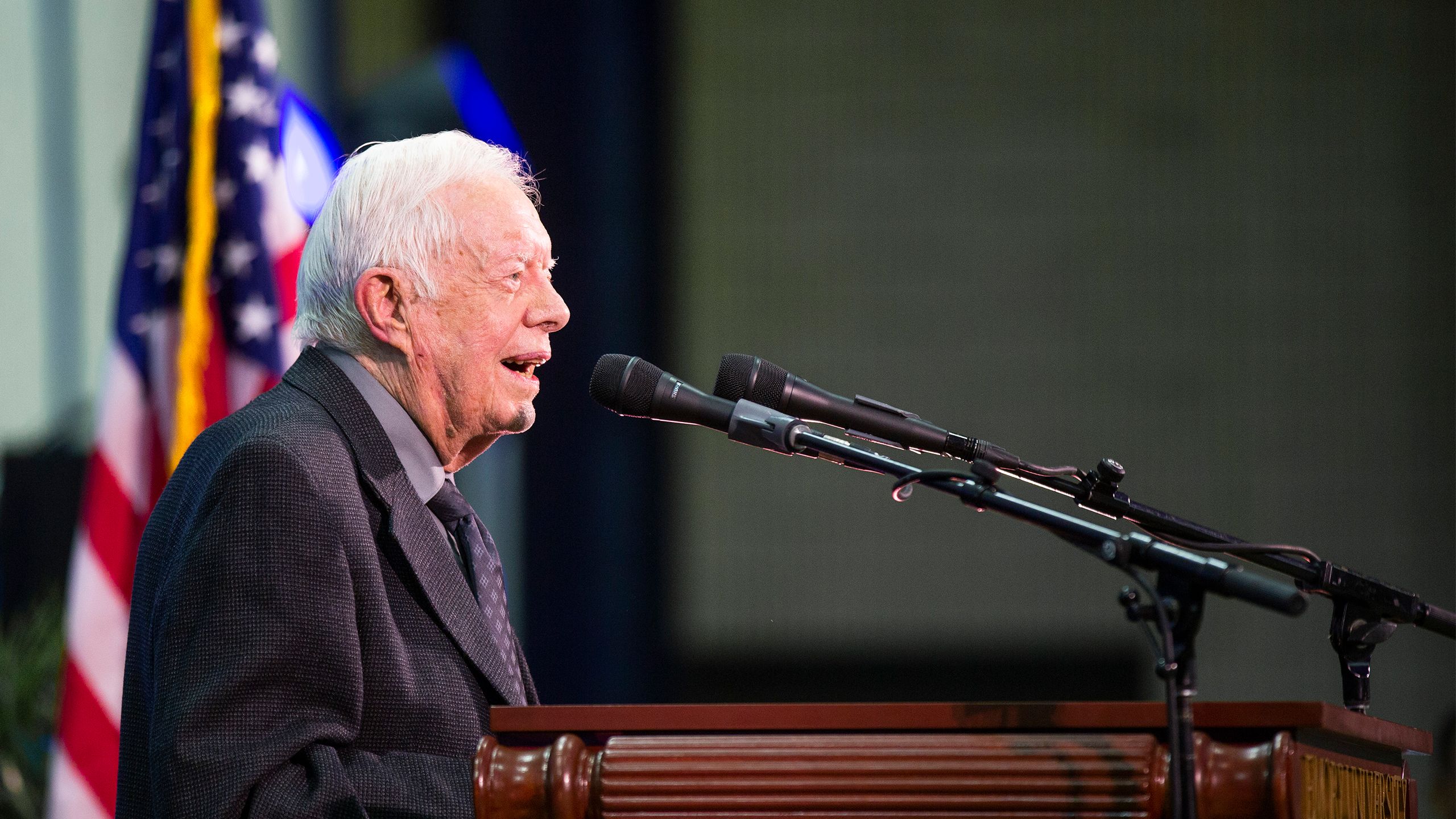
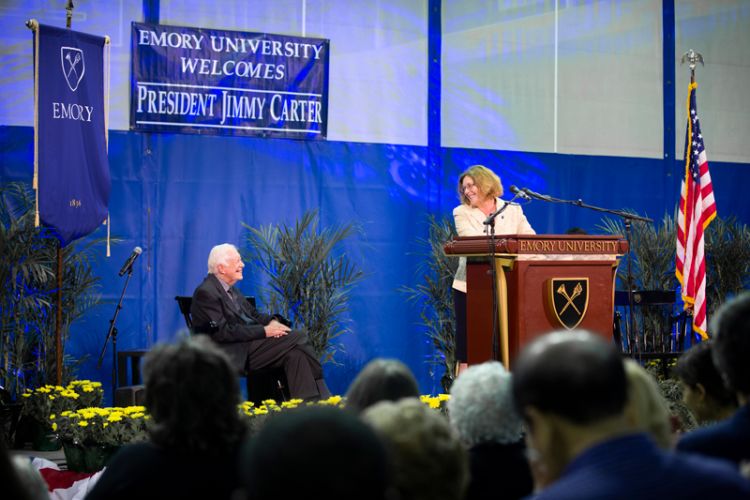
Emory President Claire E. Sterk introduces former U.S. President Jimmy Carter at the start of the Carter Town Hall.
Emory President Claire E. Sterk introduces former U.S. President Jimmy Carter.
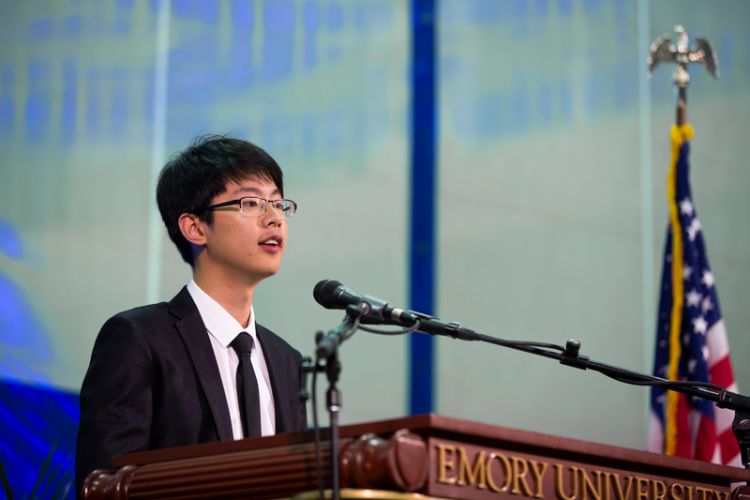
Student Government Association President Dwight Ma speaks at the start of the Carter Town Hall.
Student Government Association President Dwight Ma speaks at the start of the Carter Town Hall.
In a lively meeting of generations, former U.S. President Jimmy Carter joined first-year Emory students for the 37th annual Carter Town Hall, a long-standing tradition that offers the university’s newest class a firsthand glimpse into the mind of the global humanitarian.
Amid an hour-long exchange that embodied both a personal history lesson and current events class, some 1,700 students from Emory College and Oxford College gathered in the Woodruff PE Center on Sept. 12 to present a sweeping range questions, which the 93-year-old international statesman answered in stride.
Inquiries ranged from the serious (his thoughts on immigration, global warming and the #MeToo movement) to the sentimental (the most memorable day of his career). At times, they even drifted to the lighthearted — smooth or crunchy peanut butter?
Carter warmly fielded them all, demonstrating the care and thoughtfulness that have become hallmarks of his role as an Emory University Distinguished Professor, a position he’s held since 1982.
The far-reaching impact of Carter’s work was highlighted during welcoming remarks by Emory Student Government Association President Dwight Ma, who credited Carter with normalizing relations with China during his term as the 39th U.S. president and “allowing the first group of international students from China to come to the U.S. to study.”
Before Carter left the White House, 100,000 Chinese students were studying in America. As of last year, more than 350,000 students from China were attending U.S. universities. “Personally, without President Carter, I wouldn’t be here today,” said Ma, an Emory College student from China and a former Carter Center intern.
In her introduction, Emory President Claire E. Sterk praised Carter for his human rights advocacy, his longstanding battles against racial injustice, his successful campaign to eradicate Guinea worm disease around the world, and the courage demonstrated through his leadership as a former Georgia governor and U.S. president.
And although his wife, Rosalyn Carter, had conflicting obligations and couldn’t attend the town hall, Sterk acknowledged both Carters for their ongoing roles as “advocates, teachers and two wonderful examples of compassion for us all.”
Politics and policies
Opening the evening’s conversation, Carter jokingly acknowledged trepidation over the questions he would receive from students, collected on paper ballots and through social media.
Much of the focus centered on his career as a political leader and global humanitarian, and his views on today’s political challenges.
When asked his thoughts on today’s immigration crisis, Carter flatly replied that “we should not have an immigration crisis,” advocating instead for a clear pathway for those seeking citizenship and allowing young people born in the U.S. to automatically become citizens.
Asked to identify the greatest single threat facing today’s young generation, Carter first described a failure to treat “other people in our country and in foreign countries as equals to us.”
Carter then specified global warming, which he predicted may accelerate damaging hurricanes — like Hurricane Florence, affecting the East Coast this week — and rising sea levels, threatening coastal cities and displacing residents.
Asked to describe what he would change if he were again president, Carter said that if he were “foolish enough” to feel he could take on the role, he would change the policies President Trump has initiated. Later, when asked about Trump’s approach to North Korea, Carter, who has visited the country three times, said the president has handled the situation “properly” and praised him for meeting with North Korean leader Kim Jong-un, noting that he is glad they discussed a verbal peace agreement, even though no specifics have been formally decided.
“I have to say, as a Christian, I pray for President Trump,” Carter said. “I pray that he will keep our country at peace and I pray that he will promote human rights. I pray that he will be successful in eliminating the threat of nuclear attacks from North Korea.”
Asked for his views on the #MeToo movement, Carter drew cheers when he proudly identified himself as a feminist. “All of my life, I have been dominated by women. And it’s been a voluntary thing on my part,” he said, citing the strong influences of his mother, sisters and his wife.
By the time he reached public office, Carter said he’d been “pretty much trained to treat women with complete equality,” noting that during his presidency, he appointed more women as federal judges than all of his predecessors combined.
Asked how he would like to be remembered generations from now, Carter replied, “I would like to remembered as a champion of human rights, I would like to be remembered as a president who kept our country at peace and promoted peace for everybody else in the world with whom we had contact, and I would like to be remembered as having been a distinguished professor at Emory University.”
After leaving the White House, Carter recalled being invited by the Georgia Board of Regents to become a distinguished professor for the state university system.
Instead, he chose to join Emory based upon the quality of education, high standards and the freedom offered him by then-Emory President James T. Laney, “who promised me that I would never be censored,” Carter said. “And I haven’t been.”
“I’m very proud to have been associated with Emory,” Carter said. “It’s been one of the great honors of my life.”
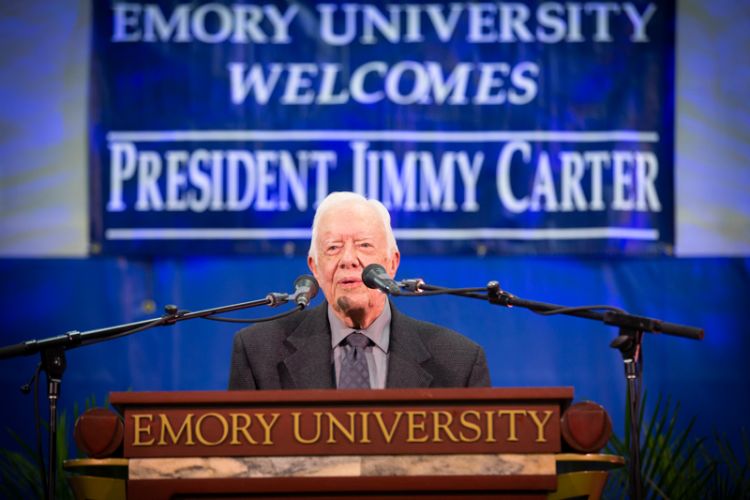
President Carter joined Emory's faculty in 1982. “It’s been one of the great honors of my life," he told the Town Hall audience.
President Carter joined Emory's faculty in 1982. “It’s been one of the great honors of my life," he told the Town Hall audience.
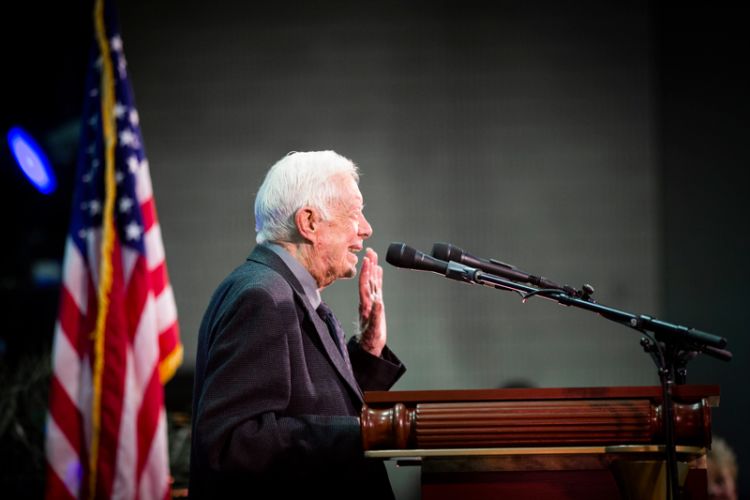
The college years are "a time for you to shape the future and to define some principles in your own lives that will never change,” President Carter told Emory students. “Use your freedom to explore ideas that you won’t be able to do in the future.”
The college years are "a time for you to shape the future and to define some principles in your own lives that will never change,” President Carter told Emory students. “Use your freedom to explore ideas that you won’t be able to do in the future.”
‘Principles that never change’
Asked to recall the most valuable advice he’s ever received, Carter cited a high school teacher, Miss Julia Coleman, who told her students “we must learn to accommodate changing times, but cling to principles that never change.”
In his own life, Carter identified those unwavering principles as telling the truth, being nice to your neighbors, and being committed to freedom and democracy — pillars that were reinforced during his time at the U.S. Naval Academy in Annapolis, Maryland.
“This is a time for you to shape the future and to define some principles in your own lives that will never change,” he told students. “Use your freedom to explore ideas that you won’t be able to do in the future.”
Speaking on a more personal note, Carter described a life that remains deeply rooted in the rural community of Plains, Georgia. He still teaches Sunday School classes twice a month at his Baptist church, where the Sunday morning sanctuary can swell to 700 visitors from all over the world, who begin arriving at midnight to claim a seat.
Today, his grandchildren mark the 8th generation to grow peanuts on the same land that his family has farmed since 1833, he said. Asked if he prefers his peanut butter smooth or crunchy, Carter diplomatically confided that it depends on the snack — creamy on a sandwich, crunchy on a cracker.
Reminiscing about his small-town roots, Carter noted that not only did he grow up next door to his future wife, he still recalls being invited over to meet her the day she was born.
In fact, when later asked what had been the most memorable day of his career, Carter smiled broadly and replied, “When my wife said she would marry me”— a decision, he admitted, that it took her a few months to reach.
“It affected my life in so many beneficial ways,” he said. “We’ve been married now for 72 years.”
About this story: Written by Kimber Williams. Photos by Ann Watson. Video by Ann Watson and Corey Broman-Fulks.


